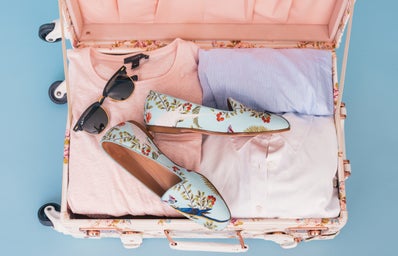Spring semester, which is a popular time for students to study abroad, has begun. Living in a new country alone for several months can seem very intimidating, especially if you haven’t traveled much previously. But as someone who felt the same way before going on exchange, I can assure you that there is nothing to fear, and abroad very well may be one of the most eye-opening and unique experiences of your life. If you take some steps in preparation, your experience will run more smoothly and you’ll have a better time, so here are some tips I’ve gathered to make sure you are equipped for your journey.
-
Comfortable Shoes
It is so important to have a pair of shoes that are very comfortable and durable because you will do A LOT of exploring in both your host country and surrounding countries during your time abroad. Try to find something that can withstand walking long distances on a variety of terrains. If you are going to a place that you know will be rainy, then it would be smart to invest in a good pair of rainboots.
Picture source: https://www.famousfootwear.com
-
Pack Light
Since you will most likely be traveling alone during exchange, you have to consider how many things you can physically carry by yourself. Sometimes dorm rooms for exchange students have many floors and no elevators, which makes moving a lot of heavy luggage very difficult. I found that a large suitcase along with a duffel bag will fit all my necessities. You may want to bring all your fancy dresses, but that may not be the best idea if you plan to go abroad.
Picture source: https://www.tripsavvy.com
-
Small Travel Bags
Once you are abroad, you will want to explore places beyond your school’s city on the weekends or for a few days at a time – trust me. Being in Scotland, I explored several other cities in the United Kingdom along with Geneva. Having a smaller suitcase or duffel bag comes in handy during these shorter trips when you only need to pack a few changes of clothes and a couple of important items. This way, you don’t have to bring a huge suitcase onto the train or on planes that only allow you a small carry-on luggage.
Picture source: https://stylst.com
-
Raincoat > Umbrella
If you are going abroad to a place known to be rainy and wet (i.e. all of the United Kingdom!) it’s smarter to bring a rain jacket as opposed to an umbrella. In these extremely rainy places, an umbrella won’t be enough to keep you dry because it often rains hard and with wind. Raincoats will keep your legs dry, are easier to pack and less prone to break than an umbrella.
Picture source: https://www.shopbop.com
-
Don’t Forget Adapters/Converters
Most countries don’t have the same power voltage or electrical plugs as the US. Given how important technological devices are, double check the power voltage and electrical plug shape of the countries you will be in while on exchange. You will most likely need an adapter like the one shown below. You may not need a voltage converter because the voltage range for many phones and laptops encompass the voltage in many countries, but still double check to be safe. It’s also for this reason that it’s not a good idea to bring hair styling tools. If you need these while you are abroad, invest in a cheap one when you are already overseas.
Picture source: https://www.amazon.com
-
Phones
Let’s be real. Hardly anyone can be without their phones nowadays, so it’s very important that you take the necessary steps to ensure your phone will be functioning while overseas. There are two predominant ways to do this. First, you can look into an international plan with your US phone service provider. This tends to be the most expensive method because most likely you will need to pay for the international service on top of your regular phone line, but the pros to this option is that you can keep your US phone number and get in contact easily with friends and family back home. The second option is what I opted for, which is to buy a SIM card from an overseas phone company. This is a much cheaper option, but you will have a different phone number. You may also not be able to use your new number to text a US number, but downloading apps such as WhatsApp or Facebook Messenger can let you get in touch with people back home easily.
Picture source: https://tech.thaivisa.com
-
Get Cash
Because we use our credit and debit cards so much in the US, it’s easy to forget that sometimes we can use these in certain stores or restaurants while abroad because they are cash only, or your bank may charge an international fee for using your cards (I’ll get into this topic more in the next section). You may not run into these problems, but it is smart to get cash before leaving (using overseas ATMs may also cost you a large transaction fee) just in case you do run into a sticky situation where you can’t use your cards. Plus, it’s cool to see what the currency of the country you will be living in for the next semester looks like.
Picture source: https://wallethub.com
-
Check Your Bank Card
Along a similar vein as getting cash, double check before going on exchange your bank cards to see whether or not they charge a foreign transaction fee. Many banks do this, and while it may be a small percentage of your transactions, this adds up quickly, because you will want to buy many of the new things you find abroad, try new foods, and stock up on toiletries. If your bank does charge a fee, you can opt for cash.
Picture source: https://www.suntrust.com
-
Prescription Medicine and Drugs
If you take or have prescription drugs, please bring these with you. The process of obtaining prescription drugs can be very tricky in a different country, and the drug may actually not be the exact same as it is in the US, which can lead to problems in case of an emergency. If you take any sort of medication, even if it’s over-the-counter, it would be a smart idea to bring those if you can because although it may not need a prescription in the US, your exchange country may require one. Health is so important while abroad and you do not want to take any risks in this area.
Picture source: https://www.washingtonpost.com
-
Bring Souvenirs
Bringing gifts that represent your home country or state for people you will meet overseas is something a lot of people don’t think about, but I think it’s an incredibly valuable thing to do. No matter how much you think you will be completely independent, on your own, and unable to connect with anyone in a new country, you WILL make friends, from American students studying abroad just like you, students at your school overseas, or even students on exchange from another country. These friends become an important part of your life abroad because you will be creating unforgettable memories with them by your side. By leaving them a gift, you can show your appreciation for them. Gifting a souvenir is extra special because it represents a part of you.
Picture source: https://www.amazon.com
-
Prepare 1 Formal Outfit+1 Party Outfit
Studying abroad isn’t called studying abroad for no reason; you do have to go to classes and learn. Abroad, however, is not just about learning. People go on exchange ultimately to explore a new place and culture, meet new people, and try new experiences with their newfound freedom. It’s smart to bring a dressier formal outfit along with a going out outfit because once you arrive in a new country, you will end up at an event that requires this dress code. The University of Glasgow (the school I studied at!) threw several holiday balls, and I ended up wearing my formal dress several times.
Picture source: https://shop.nordstrom.com
-
Have Fun and Enjoy Life!
Finally, my last tip is to have fun. As cliche as it sounds, you will never get an experience that is quite the same as going on exchange at any point later on in your life. Going abroad is not the same as traveling; you are experiencing life in another country when you are still young and have little serious responsibilities. Thus, take advantage of your time there and fill up every moment with new experiences. Don’t stress too much, and enjoy your life in a new country.
Picture source: https://www.visitscotland.com



